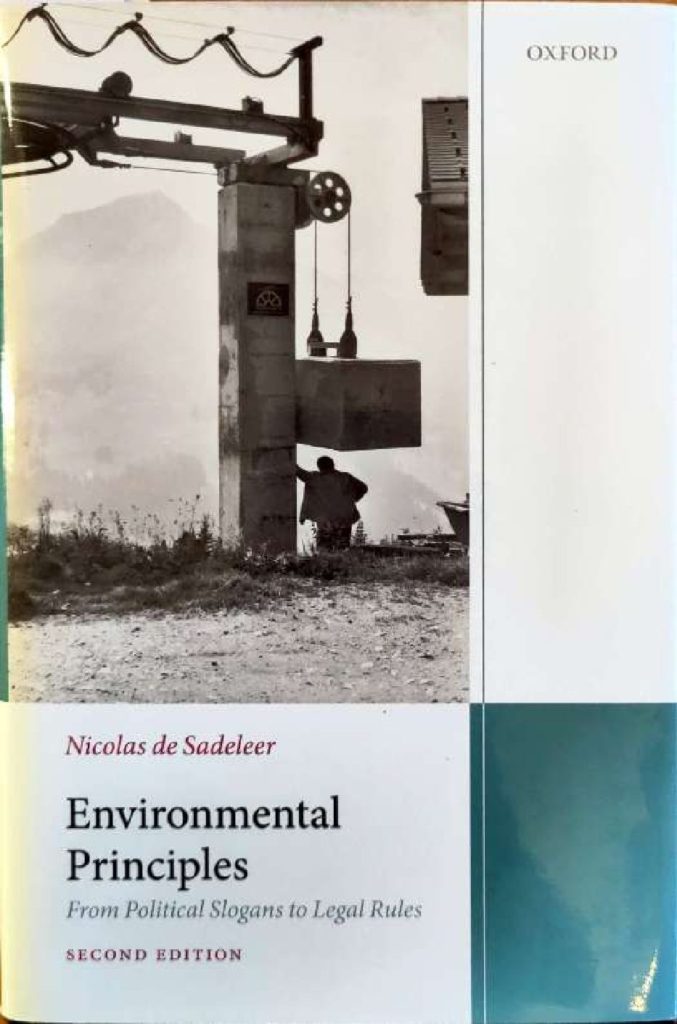This book traces the evolution of environmental principles from their origins as vague political slogans reflecting fears about environmental hazards to their embodiment in enforceable laws. Environmental law has always responded to risks posed by industrial society but the new generation of risks have required a new set of environmental principles, emerging from a combination of public fears, science, ethics, and established legal practice. This book shows how three of the most important principles of modern environmental law grew out of this new age of ecological risk: the polluter pays principle, the preventive principle, and the precautionary principle. Since the first edition was published, the principles of polluter-pays, prevention, and precaution have been encapsulated in a swathe of legislation at domestic and international level. Courts have been invoking environmental law principles in a broad range of cases, on issues including GMOs, conservation, investment, waste, and climate change. As a result, more States are paying heed to these principles as catalysts for improving their environmental laws and regulations.
This edition will integrate to a greater extent the relationship between environmental principles and human rights. The book analyses new developments including the EU Charter of Fundamental Rights, the case law of the European Court of Human Rights, which has continuously carved out environmental duties from a number of rights enshrined in the European Convention of Human Rights, and the implementation of the UNECE Convention on Access to Information
G. Roller wrote:"One of a kind, de Sadeleer's book, not only contributes to high quality environmental law scholarship, it enhances the quality of legal research in the still growing field of environmental law, and is capable of providing environmental law researchers, legal professionals, the judiciary, law students and other interested in environmental law, with a solid understanding of the three environmental principles: the polluter-pays, the prevention, and the precaution principles, and how they have developed from political slogans to legal rules, and continue to evolve against the environmental challenges of the present times." Nordic Journal of Environmental Law (2022:1)
Stefano Nespor on https://rgaonline.it/ wrote:All in all, the book of Nicolas de Sadeleer is a very useful and exhaustive source of information for any environmental lawyer. The environmental principles are interpreted in such a way to make them an important basis to reinforce environmental law. The book makes the reader think in different ways and is an invitation to leave traditional legal pathways." Environmental Law Network International Review (2021)
A.M. Moreno Molina on https://dialnet.unirioja.es/servlet/articulo?codigo=8387482 wrote:"De Sadeleer's book is not only a must-have reference for anyone wishing to deal with the subject matter, but also has the merit of giving food for thought on a multitude of topics. The author carves out a system of principles covering the whole discipline of environmental law, which was hitherto missing. After reviewing the various principles in the literature and in the case law, De Sadeleer delves in particular into three of them the polluter-pays, prevention, and precaution, which, in his view, overcome the fragmentation of environmental law." Rivista giuridica dell'Ambiente (2021)
António Cortês on https://revistas.ucp.pt/index.php/catolicalawreview/article/view/11410 wrote:“This book has a rare level of conceptual insight and tremendous analytical rigour. The author demonstrates a full command of both legislation and case law, whilst at the same time proposing an original reading and understanding of how environmental principles operate in the current labyrinthine and ever-changing panorama of environmental regulation.”
A.M. Moreno Molina, 'Review of Environmental Principles", Revista Aranzadi de Derecho Ambiental (2022) 403-414.
Santiago Manuel Alvarez Carreño on https://revistes.urv.cat/index.php/rcda/index wrote:"The importance of this book on Environmental Principles in the context of the risk society and the global ecological crisis cannot be overstated. Anyone who wants to grapple with all the numerous legal questions raised in this book, its argumentative richness, the numerous illustrations, the accurateness of the analyses, will have to read and re-read it. I can, however, guarantee that the reading will certainly be pleasant and fruitful. The reader will be left with the feeling that he has enjoyed an extraordinary book on Environmental Law, but also, more generally, that he has read a remarkable example of the role played by legal science in the new post-modern era." Católica Law Review (Jan. 2022) VI:1
José Manuel Escudero on https://www.actualidadjuridicaambiental.com/en/recension-de-sadeleer-nicolas-environmental-principles-from-political-slogans-to-legal-rules-oxford-university-press-2020-isbn-978-0-19-884435-8/ wrote:"It is impossible to summarise in a few lines the rich and powerful analytical content of a book that opens up new venues and perspectives in the study of legal-environmental issues. Professor de Sadeleer, in his generous and masterful effort to systematise the advances and setbacks of environmental protection through the law, offers us a vast repository of knowledge that is essential reading." - Santiago Manuel Alvarez Carreño, Revista Catalana de Dret Ambiental, Vol. XIINúm. 2 (2021)
'De Sadeleer reveals new nuances not previously presented in other monographs dealing with environmental law and offers a new approach to understanding it. In particular, the considerable space dedicated to the precautionary principle provides essential reading for anyone wishing to investigate its implementation. De Sadeleer's display of knowledge and command of the subject matter is impressive.'
Actualidad Jurídica Ambiental, December 2022.




